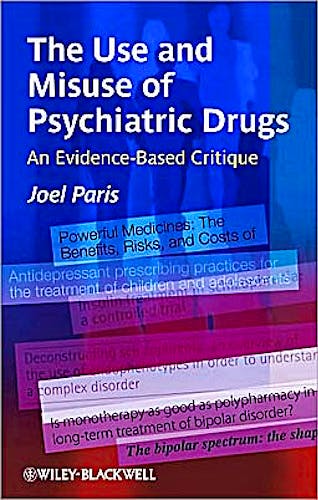

No hay productos en el carrito



The Use and Misuse of Psychiatric Drugs. an Evidence-Based Critique
Paris, J.
1ª Edición Agosto 2010
Inglés
Tapa blanda
224 pags
1000 gr
null x null x null cm
ISBN 9780470745717
Editorial WILEY
LIBRO IMPRESO
-5%
55,51 €52,73 €IVA incluido
53,37 €50,70 €IVA no incluido
Recíbelo en un plazo de
2 - 3 semanas
LIBRO ELECTRÓNICO
-5%
47,83 €45,44 €IVA incluido
45,99 €43,69 €IVA no incluido
Acceso On Line
Inmediato
Description
The message of this book is that psychiatrists have some very good drugs, but
can expect bad results when they are over-used, prescribed outside of evidence-based
indications, or given to the wrong patients. While acknowledging that many current
agents are highly effective and have revolutionized the treatment of certain
disorders, Joel Paris criticizes their use outside of an evidence base. Too
many patients are either over-medicated or are misdiagnosed to justify aggressive
treatment. Dr. Paris calls for more government funding of clinical trials to
establish, without bias, the effectiveness of these agents. He has written this
book for practitioners and trainees to show that scientific evidence supports
a more cautious and conservative approach to drug therapy.
After describing the history of psychopharmacology, including its early successes,
Dr. Paris reviews the relationship between psychiatry and the pharmaceutical
industry. This problem has received considerable popular attention in recent
years and Dr. Paris documents initiatives to increase transparency and decrease
the influence of pharmaceutical marketing on diagnosis and prescribing habits.
Dr Paris then examines some major controversies. One is the fact that newer
drugs have not been shown to be superior to older agents. Another is that while
the number of prescriptions for antidepressants has increased dramatically,
meta-analyses show that their value is more limited than previously believed.
Still another is the widespread prescription of mood stabilizers and antipsychotic
drugs for patients, including children and adolescents, who do not have bipolar
illness. Polypharmacy is an especially contentious area: very few drug combinations
have been tested in clinical trials, yet many patients end up on a cocktail
of powerful drugs, each with its own side effects.
Dr Paris briefly considers alternatives to pharmacology and again calls for
more clinical trials of these approaches. He also discusses the current trend
to medicalizing what many would describe as normal distress and states succinctly:
Some things in life are worth being upset about.
Table of Contents
Introduction
I Overview
1 The history of psychopharmacology
2 The science of psychopharmacology
3 The pharmaceutical industry
II Drugs in practice
4 Antipsychotics: for better and for worse
5 Mood stabilizers and mood instability
6 Antidepressants and anxiolytics
7 Prescribing for children and adolescents
8 The path to polypharmacy
III Perspectives
9 Alternatives to drugs
10 Medicalizing distress
11 The future of psychopharmacology
Bibliography
Index
Author Information
Joel Paris is a professor of psychiatry and former department chair who has
taught in a large university for 40 years. A researcher (with over 150 publications),
a clinician, and the editor of a major journal, he has written/edited 12 books.
He writes in a way that can readily be understood by clinicians.
Joel Paris is an active researcher, primarily in personality disorders and child
& adolescent psychiatry, and both this and his considerable practical expertise
enable him to argue intelligently both for and against the use of psychotropic
medications. His background as a medical investigator and broad experience in
teaching young psychiatrists about the use of drugs help him to make neutral
judgments about complex issues.
© 2025 Axón Librería S.L.
2.149.0